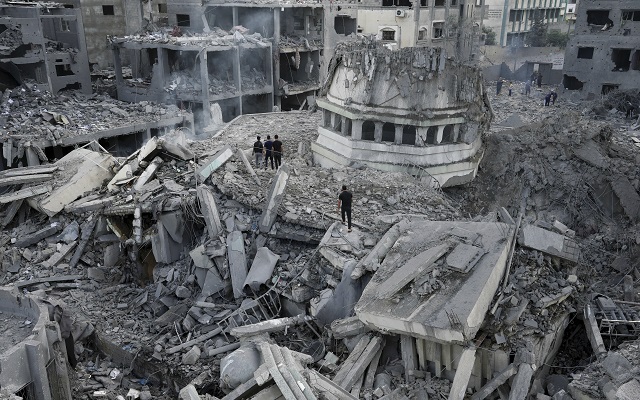
But those on both sides of the war who want peace have long known what needs to be done
COMMENT | BERNARD HAYKEL | Following the end of the recent weeklong ceasefire, Israel has resumed its war in Gaza, and dropped leaflets urging Palestinians to head toward the Rafah border crossing with Egypt. That has raised concerns that Israel is taking preliminary steps toward expelling Palestinians fully from the enclave, despite a stern American warning not to do so.
Whether it is intended or not, expulsion would have catastrophic consequences for regional security and stability. The United States and its Arab partners urgently need to step in to compel the Israeli leadership to halt the war and think more strategically. Perhaps the trauma of Hamas’s attack on October 7 has blinded Israeli leaders to the effects of their decisions. They should be reminded that Israel – along with the U.S. and its other allies – have much to lose if the region descends into chaos and radicalisation.
After all, an expulsion of Palestinians from Gaza would likely unravel the longstanding peace agreements between Israel and Egypt, and between Israel and Jordan. Those neighbouring governments would be unable to withstand the public outcry and accusations of collusion with Israel. It would be the end of the US-led effort, launched by the late Henry Kissinger just after the 1973 Yom Kippur War, to create a Middle East security architecture and work toward regional peace.
Saudi Arabia and other Arab allies could also be destabilised, eliminating the possibility of any future peace agreements like the one that was taking shape between Israel and Saudi Arabia until October 7. Given that the US was earnestly facilitating that process, events on the ground in Gaza now threaten its standing in the region.
If Israel has a well-considered strategic goal for the war, it has yet to articulate it. Even if a decisive military victory over Hamas were possible, that would not deliver peace or a more stable security environment for Israel. In fact, Hamas’s popularity among Palestinians has increased since October 7, as has its presence in the West Bank and in Palestinian refugee camps throughout the region. In Lebanon, for example, Hezbollah has been helping Hamas take control of Palestinian refugee camps.
Far from putting an end to Hamas and the threat it poses, a Palestinian exodus from Gaza would generate an even more radical Palestinian movement in the West Bank and elsewhere. The biggest winner would be Iran, which thrives on chaos, and the biggest losers would be those who long for a peaceful and prosperous Middle East.
That is why the U.S., in close coordination with Saudi Arabia and other Arab allies, must urgently press Israel to stop the war, and to restart negotiations toward creating a viable Palestinian state and achieving peace with the major Arab countries. War and deeper mutual hatred are what Hamas and Iran want. When Hamas led suicide-bombing campaigns in the 1990s and the 2000s, its goal was to derail any Israeli-Palestinian rapprochement. Likewise, one of the suspected reasons for its October 7 attack was to preempt peace between Israel and Saudi Arabia.
Israel must avoid blindly abetting Hamas’s agenda, part of which is to radicalise Palestinians and the broader Arab and Muslim worlds. It is telling – and deeply troubling – that al-Qaeda and other global jihadist movements have come out of relative hibernation to praise Hamas and call for jihadist violence everywhere. We are already seeing the fruit of their efforts in the recent stabbing attack in Paris.
With Israeli Prime Minister Binyamin Netanyahu politically weakened, perhaps fatally, by the October 7 security failure, only the war is keeping him in power. But that means the U.S. has an opportunity to end the bloodshed and sideline the extremists at the same time. Just as the Yom Kippur War created an opening for peace, the current Gaza war could allow the conflict to be reframed. For years, polls in Israel and the Palestinian territories have indicated that significant percentages of both populations would support resolving the conflict, should the chance arise. By the same token, Hamas has never enjoyed majority support, and it tends to gain in popularity only during periods of violence.
Of course, reaching a peace settlement will be painful, requiring huge sacrifices by both Israelis and Palestinians. It would certainly involve dismantling Jewish settlements in the West Bank, as well as giving up on the dream of a Palestinian state “from the river to the sea.” But as agonising as such concessions may be to some parties, they are ultimately details in the larger picture. Those on both sides who want peace have long known what needs to be done.
President Joe Biden’s administration stands to gain immensely by making it clear to Israel what its strategic goal ought to be, what it stands to gain from peace, and what America’s own overriding strategic imperatives in the region are. Domestically and internationally, Biden will benefit from reasserting America’s standing as the only country that can help resolve this conflict.
Saudi Arabia’s support in the effort also will be crucial, given its clout in the Arab and Muslim worlds, and its own repeated attempts to draft a roadmap for full regional peace. The recent Islamic-Arab Summit in Riyadh showcased the Kingdom’s convening power, and the final communiqué illustrated that none of Iran’s radical demands – such as its call for an oil embargo – were taken seriously. Instead, signatories reiterated the importance of the two-state solution for the umpteenth time.
The Gaza war presents the U.S. and governments across the Middle East with an opportunity to end Hamas and Iran’s cynical project of perpetual conflict and chaos. But it can be seized only by stopping Israel from expelling the Palestinians from Gaza, and by providing both sides with hope for a peaceful resolution to a conflict that has gone on for too long and at too great a cost for too many people.
*****

Bernard Haykel, Professor of Near Eastern Studies at Princeton University, is completing a book on Saudi Arabia’s modern history.
Copyright: Project Syndicate, 2023.
 The Independent Uganda: You get the Truth we Pay the Price
The Independent Uganda: You get the Truth we Pay the Price



